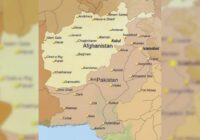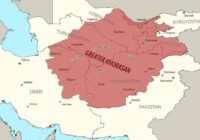A Return to Darkness
The Taliban’s ban on women’s access to work and education is just the latest example of their inability to reform or moderate. If the international community once held any realistic hope that the Taliban might soften their extreme policies, that hope has now evaporated.
The cowardly escape of President Ashraf Ghani along with The Doha agreement signed on February 29, 2020, paved the way for the final collapse of the Islamic Republic of Afghanistan on August 15, 2021. The country was plunged back into an age of repression.
Afghanistan now faces an escalating political and humanitarian crisis. NATO member states, the UN, and other humanitarian organizations have been sending aid in an attempt to mitigate the Taliban-created disaster. Since 2022, Afghanistan has received approximately $2.4 billion in aid.
The international community continues to push the Taliban to form an inclusive government, respect human rights, and prevent the spread of terrorism. Yet, engaging with the Taliban in hopes of moderation is futile—because moderation itself contradicts their core ideological principles.
The Taliban’s Ideological Foundations
The Taliban are not merely a military movement; they are a radical Islamist and Pashtun dominated tribal group whose ideology is built around three core pillars: their ends, ways, and means.
End Goals: The Islamic Emirate and Absolute Obedience
The Taliban pursue two overarching goals: one in this life and one in the afterlife. Their vision for the afterlife is simple—to enter heaven. In this world, their primary objective is to enforce their own interpretation of Sharia (Islamic law) by establishing the Islamic Emirate of Afghanistan (IEA). Under this system, an Emir or supreme leader rules absolutely, and all citizens are expected to obey without question.
The Taliban construct their legal framework through a selective and self-serving application of Islamic jurisprudence, using sources such as traditions of the Prophet Muhammad, juridical consensus, reasoning by analogy and benevolence.
Mullah Haibatullah, the Taliban’s supreme leader, has been explicit about his commitment to absolute Sharia rule. Addressing the United States, he said:
“You have used the mother of all bombs, and you are welcome to use even the atomic bomb against us, because nothing can scare us into taking any step that is against Islam or Sharia.”
The Taliban also impose their dominance through ethnic oppression, particularly targeting non-Pashtun groups like the Hazaras. Their leaders enforce Pashtunwali, a tribal code emphasizing patriarchal control, revenge, and honor, which further entrenches social division and gender subjugation.
Understanding these ideological end goals is key to deciphering the Taliban’s policy decisions and long-term ambitions.
How the Taliban Maintain Control: Suppression, Exclusion, and Fear
The Taliban enforce their ideology through elimination, exclusion, and submission. Their doctrine mandates eradicating any resistance against the IEA—by force if necessary. Maulawi Mujeeb Rahman Ansari, a Taliban ally, openly stated:
“Anyone who opposes the current government should be beheaded.”
Following these directives, the Taliban have carried out hundreds of extrajudicial killings since 2021. In Daikundi province, Taliban fighters massacred eight Hazara civilians, including children as young as six. In Panjshir, Hasht-e Subh Daily reported that the Taliban executed 27 people accused of having ties to the National Resistance Front. The IEA consistently favors annihilation over dialogue.
Beyond outright violence, the Taliban have established a system of exclusion and repression. Their ruling cabinet consists of 33 men—30 of whom are Pashtun, with only token representation for Tajiks (two members) and Uzbeks (one member). This structure excludes Afghanistan’s other major ethnic groups, reinforcing Pashtun dominance.
Citizens are treated as subjects. The Taliban dictate dress codes, personal grooming, and religious practices, enforcing their version of Islam on every aspect of life. Those who fail to comply face brutal consequences.
Women, in particular, have been reduced to second-class citizens. Under the Taliban’s interpretation of Islam, women belong in the home—to cook, bear children, and serve men. As a result, the Taliban have:
- Banned women from education and employment.
- Imposed mandatory full-body coverings (burqas).
- Prohibited women from traveling without male chaperones.
When women protest, the Taliban respond with gunfire. Civil society organizations and political groups have been systematically silenced. The IEA tolerates no opposition.
The Taliban also reject modern institutions such as democracy, elections, and human rights. Mullah Haibatullah has condemned these concepts as “anti-Sharia.” Instead, the Taliban prioritize religious education, converting secular schools into madrasas. Their goal is clear: to dismantle Afghanistan’s liberal institutions and replace them with an extremist Islamic order.
Resources and Financial Backing: How the Taliban Sustain Themselves
The Taliban are well-funded and have a steady supply of recruits, drawn largely from impoverished, uneducated Pashtun communities. Before toppling the Afghan government in 2021, they commanded an estimated 60,000 core fighters and 140,000 auxiliary members.
Financially, the Taliban rely on two primary income sources: domestic taxation and foreign support. Between August and November 2021 alone, they collected $270 million million in taxes. Other revenue streams include:
- Illegal opium cultivation and drug trafficking
- Illicit mining and resource extraction
- Extortion and unlawful taxation
In 2020, NATO estimated that the Taliban earned $1.6 billion from illicit activities.
During their insurgency, the Taliban received extensive foreign funding. A Combating Terrorism Center report in 2021 revealed that they benefited from financial, logistical, and technical aid from neighboring and Gulf countries, private donors, extremist groups, and al-Qaeda. The Taliban are among the wealthiest extremist organizations in the world.
The Taliban will not change
Many in the international community hoped that the Taliban, having learned from their past mistakes, would moderate their governance after reclaiming power in 2021. This belief was naive.
During their first reign (1996–2001), the Taliban’s refusal to surrender Osama bin Laden after 9/11 led to their downfall. After their defeat, they claimed to have softened their fundamentalist stance. This was a deception—designed to mislead both the Afghan people and the world.
The Taliban are a product of a rigid, absolutist ideology. Democratic governance, human rights, and scientific progress threaten their existence. Their leaders understand that survival depends on adhering to radicalism, not moderation.
What the International Community Must Do
The world now faces a choice:
- Continue engaging with the Taliban, thereby legitimizing and strengthening their regime.
- Support democratic opposition groups, including political activists, ethnic representatives, women leaders, and the younger generation.
To counter the Taliban effectively, the international community must:
- Attach strict conditions to any aid.
- Ban free travel for Taliban officials.
- Limit direct engagement with the IEA.
Over time, these measures will weaken the Taliban’s grip while increasing the international community’s leverage.
The world must stop waiting for the Taliban to change. They won’t.
[Christian Hadjipateras and Anton Schauble edited this piece.]
The views expressed in this article are the author’s own and do not necessarily reflect Fair Observer’s editorial policy.
Support Fair Observer
We rely on your support for our independence, diversity and quality.
For more than 10 years, Fair Observer has been free, fair and independent. No billionaire owns us, no advertisers control us. We are a reader-supported nonprofit. Unlike many other publications, we keep our content free for readers regardless of where they live or whether they can afford to pay. We have no paywalls and no ads.
In the post-truth era of fake news, echo chambers and filter bubbles, we publish a plurality of perspectives from around the world. Anyone can publish with us, but everyone goes through a rigorous editorial process. So, you get fact-checked, well-reasoned content instead of noise.
We publish 3,000+ voices from 90+ countries. We also conduct education and training programs
on subjects ranging from digital media and journalism to writing and critical thinking. This
doesn’t come cheap. Servers, editors, trainers and web developers cost
money.
Please consider supporting us on a regular basis as a recurring donor or a
sustaining member.
Will you support FO’s journalism?
We rely on your support for our independence, diversity and quality.








Comment